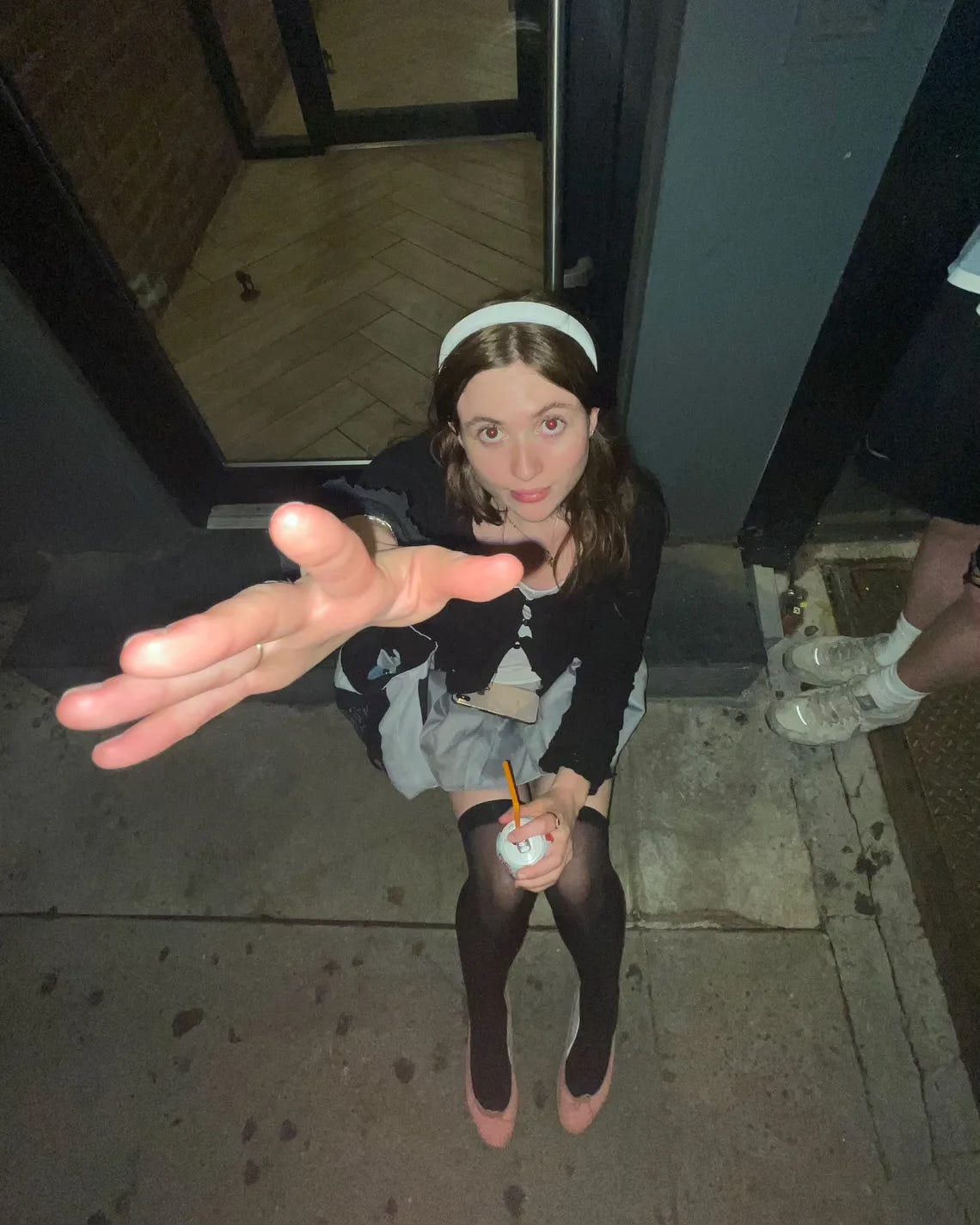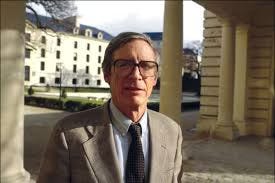HONOR LEVY’s My First Book (2024)
The time has come for a post on the ethics of a pan. Theoretically speaking, the pan should not exist. I spend a great deal of time on this Substack arguing that all expression is of value, that all writing should be treated with tremendous sympathy — and if a book doesn’t come together, well, it’s better to just not write anything about it. A pan, then, isn’t really about the book; it’s about the industry. Sometimes, or very often, the industry gets misled — or chooses to mislead — and then, in an era of sycophantic, follow-the-leader reviews, it’s important to call a spade a spade and to say what all honest readers, somewhere inside themselves, must be thinking.
It goes almost without saying that My First Book is awful. For the most part, that shouldn’t matter. Levy is 26. She has her moments. I learned some things from reading My First Book — it does distill into digestible form the Gen Z, endlessly-online mindset. But the book is being intensely promoted as something very different from what it is — as “what it must have been like to read Ann Beattie on her generation in the early 1970s,” according to Dwight Garner in The New York Times, as “the undisputable arrival of a truly talented stylist,” according to The Cleveland Review of Books. Levy, from long before the publication of this book, was being treated as the voice of a generation, somewhat similarly to what Lena Dunham was at the same age. Even Compact Magazine, which is normally more ill-tempered than this, was taken in and wrote, “I was surprised to find the book inventive, beautifully written, and worthy of the attention it has garnered.”
Au contraire. There’s so much wrong with My First Book that it’s hard even know where to begin. Not only is it not stories, as advertised, but it shows no ability to exist in imaginary space. It’s like several steps short of autofiction, training wheels for autofiction — Levy entirely as a creature of ‘discourse,’ showing off her facility with the terms of discourse and trying out different voices through which the discourse might most appreciate her.
The overall feeling is like an exploratory campaign for a very minor office, in which we watch Levy attempt to build her constituency. She’s a Gen Zer and several ‘chapters’ are dedicated to proving her bona fides to her base — she is at ease in its lingo, she is as a matter of course addicted to adderall. But she can good-naturedly tease her generation and its self-importance — she makes rape jokes! she enjoys getting manspalained! She is positioning herself as a Bret Easton Ellis or Tao Lin — or, as she would put it, an ‘edgelord,’ chronicling the dark side of her generation so that her elders may understand them. Which leads into the real purpose of the book — the spoiled, zany, aware-of-her-own-messes-just-enough-to-laugh-at-them-but-not-clean-them-up privileged young woman looking for, once again, the pat on the head, the reassurance that yes she is (if for no particular reason) special.
But in building that constituency there is no sense of an actual thinking, feeling person behind the voices — it’s just ventriloquism, seeing how she can best get a rise out of her audience — and I found myself reading this a bit differently than I’ve read anything before, as a kind of Petri dish of everything awry in the buzzy, “scene-y” literary discourse, and, instead of reading for plot or character or anything like that, reading more like a prosecutor, looking to identify the various influences that had so corrupted young Honor’s writing.
Going line by line, here are some of the accusations I would make:
“At my college on the hill above the factory, above the river, above the town, we have clean water and emotional support rodents.” — I blame Nathaniel Rich and the New Yorker’s Shouts & Murmurs section, the guileless baby voice as a way of being unaccountable for everything else in the writing.
“Before Louis XIV was the Sun King with a hall full of mirrors, he was a little boy and there was a civil war.” — I blame McSweeney’s and the twee school of American writing, the premise that all the world’s knowledge is a Wikipedia click away and accessible for one’s fiction but only if you make an inner promise to not take any of it seriously.
“Everyone told her good job. I wonder if anyone said that to Thomas’ mom.” — I blame Lidia Yuknavitch, the idea that endless digital solipsism can be redeemed by a sudden burst of earnest social consideration.
“He’s so sick of performing masculinity. He wants to be absolutely annihilated.” — I blame a combination of New York Magazine and Gawker, the notion that everybody can be distilled down into their little micro-demographics, and the more surgical you are about types the more cutting your writing will be.
“I’m eleven. I’m on Safari on a safari on the internet after school in my bedroom on my computer.”— I blame Rachel Cusk, and the idea that serious contemporary writing means vacuuming all the flavor out of life and giving only the atomized husk.
“My Dance Dance Revolution lost. Like all hope for an anticapitalist revolution after 1970.” — I blame Jonathan Safran Foer (among many others) and the premise that all possible taste in writing should be sacrificed to the mildly amusing.
“It’s quirked up. You’re Nicholas Cage. The best and the worst.” — I blame Russell Simmons and slam poetry’s idea that you can short-circuit art with a word salad of pop culture references.
“But I’ve been called special a thousand times. My dad thinks I’m special.” — I blame Zooey Deschanel and the premise that being self-importantly daffy is somehow endearing.
“In me he saw refracted everything wrong with the world.” — I blame Phoebe Waller-Bridge and the idea that the self-combusting of the spoiled young woman is actually a world-historical event and deserving of the most far-reaching hyperbole.
“We all want to be Dachau liberation day—skinny for spring break on Little Saint James.” — I blame Honor Levy. This is a whole new level for me, everything brought to the level of a meme and with the premise that the more randomly offensive you are the cuter it is.
In the end, I suppose I really blame Dwight Garner. Garner, who clearly was as appalled by the book as I was, limited himself to a mild “she was encouraged to publish too soon.” This was what Levy’s publishing team was clearly banking on: that the reputable critics would go easy on her given her age and it might be possible to create a phenomenon of the Voice-of-GenZ — a marketing gimmick that Levy then wrote into. It’s very cheap stuff and it’s predicated on reviewers playing along and not saying what’s completely obvious.
ALEXANDRE LEFEBVRE’s Liberalism as a Way of Life (2024)
This is a special book in somewhat unattractive wrapping.
There are a few things that are off-putting. One is that Lefebvre has clearly spent too much time delivering university lectures — and has the lecturer’s habit of dropping in as many pop culture references as possible to let the students know he’s not as fusty as they might think. Another is that Lefebvre is so smitten with John Rawls — and particularly with Rawls’ first book A Theory of Justice — that much of Liberalism as a Way of Life reads like an almost sentence-by-sentence gloss on Rawls. And another is that Lefebvre wants also to write self-help for the practicing liberal and loads his text down with, unexpectedly, a series of practical exercises for cultivating a liberal cast of mind.
But all of that should be pushed through because Lefebvre is a rare entity — a philosopher with heart. He genuinely loves liberalism, is genuinely upset by its bastardized iteration (“liberaldom”) which passes for a liberal way of life, and is determined to rescue it from its false practitioners. Given how famously slippery a term liberalism is, Lefebvre also comes surprisingly close to establishing a working theory of it.
His liberalism is, above all, a positive way of being in the world. It is not just the everybody-do-their-own-thing tolerance that is associated with John Stuart Mill and the somewhat standoffish theory of political liberalism. He is speaking for people who are “liberals all the way down” — and who are looking to establish liberalism as an all-encompassing ethical theory. What he is really looking to do (although he tiptoes around the word) is to establish the credo of a religion and to have it be a worthy secular successor to the theological systems.
For Lefebvre, liberalism is, first, to be understood as the product of a particular place and time — the Enlightenment era with religions and autocracies in recession across the Western world. Liberalism emerged as a kind of miracle — a social contract based on a societally-pervasive spirit of reciprocity. For Lefebvre, the time this took to set in only proves his point: once the principle is there it sweeps through the society with a quiet inevitability. Or as he puts it, “Reciprocity for all is the moral adventure of liberalism and has profound psychological effects.” In one of the book’s more arresting modules, Lefebvre traces out the history of swearing in America and concludes that a paradigmatic change occurred around the civil rights era in which cursing based on the sacred/profane (“holy shit”) lost its ability to shock while slurs based on cruelty (“retard,” etc) became the psychically charged terrain.
What was happening, Lefebvre contends, was a vast transition from an ethical system worried about offending the touchy Man in the Sky to a sort of Jainist ethics based on an abhorrence of cruelty and injustice. As Lefebvre writes, “When morality sheds (or just plain forgets) its vertical dimension, being a good person means not harming others. That’s all there is to it.”
This slow transition was codified in John Rawls’ 1971 work A Theory of Justice and it was predicated on the society that had emerged under liberalism’s aegis — “the well-ordered society,” in which the principles of reciprocity were inculcated so deeply in social relations that the practice of liberalism could come to depend above all on the ethical choices of individuals. This iteration of Rawls’ thought is referred to as “The Cathedral” and Lefebvre spends a great deal of effort celebrating its various votaries, Leslie Knope, Mike Psenicska in Borat, etc, who, under sometimes trying conditions, maintain civility and a glistening liberal worldview.
There are two challenges to Lefebvre’s vision. One is that Rawls himself largely stopped believing in it — or, as Lefebvre writes, he “drew a bright line” between comprehensive philosophical systems and political structures. And some of what Lefebvre is up to is rear guard action, saving Rawls from himself. He tries to get back into the spirit of A Theory of Justice, contending that even if liberalism lacks the ability to be coercive on those who do not accept its premises it is still possible for those of a liberal disposition to create something like the well-ordered society through ethical right action and an internalized spirit of justice. Hence the ethical exercises Lefebvre gives. The other challenge is that liberalism itself all too often disintegrates into what Lefebvre calls “liberaldom,” the self-righteous hypocritical derivation that has the same relationship to liberalism as Christendom does to true Christianity. Tocqueville in the 1830s had noticed to what extent liberalism seemed to produce a tendency towards mediocrity, and a cold individualism — and Lefebvre, with real anger, spends considerable time addressing the “meritocracy trap,” the latter-day iteration of what Tocqueville noticed, in which many ostensible liberals are in fact trying to break out of the social contract and create a self-perpetuating elite. For Lefebvre, the antidote once again lies in self-growth — in developing what Rawls calls an “aristocracy for all,” in which individuals within themselves abjure the tendency towards mediocrity but have the capacity as well to not be coercive, to encourage the full self-fulfillment of others.
The problem — as Lefebvre seems to be aware — is that he is resting too much on individual agency as opposed to institutions and collective action. It’s a lot to ask for everybody in a society to all adopt liberal values together and then to forbearingly disregard anyone illiberal who happens to come across their path — as Borat’s various interlocutors are able, ultimately, to laugh him off. Illiberalism has a stronger power than that, and the ways that so many societies recently have slid into illiberalism indicate that liberalism is not sustainable alone through right action by its practitioners. Since liberalism, by definition, lacks the ability to impose itself on those who do not accept its principles, liberalism is always in a vulnerable position to those who wish to subvert it. For liberalism to survive, then, rests on a series of robust institutions that the entire society can agree to (a government, a security system, a judicial process, etc), all of which when you really get into it have force and coercion at the heart of them — the system functioning through fear rather than generous reciprocity. Where liberalism is on firmer ground is in property relations, and as Lefebvre knows but doesn’t particularly address, liberalism’s emergence in the Enlightenment era was concurrent with the rise of a bourgeoisie that relied on social contract theory above all as a means of maintaining property and a smoothly-flowing market. Liberalism seems to work very well in that domain where engaging in reciprocal relations rebounds to the individual benefit of all engaged in them. It seems to work less well when it’s contingent on far-ranging compliance amongst multifarious actors. As far as I can tell, Lefebvre’s notion of liberalism keeps returning to enthusiastically paying one’s fair share of taxes. That’s all good and well in a well-ordered society, but in a society where everybody is taking all available deductions (like ours) paying full freight is a way of being a dupe; while if the social infrastructure starts to break down, or even if tax revenues are wildly misspent on the military (as is currently the case for us), then it becomes somewhat harder to see how the enthusiastic payment of taxes is really the heart of the well-functioning liberal society as opposed to the improvement of central institutions.
So in the end, I guess, I am very tempted but not quite sold. It would be nice to join the choir of the liberal cathedral, but I find myself being a bit more Hobbesian than that. I do feel that power relations are the underpinning of the society more than reciprocal social contracts, and if that’s the case than The Cathedral, magnificent as it is, turns out to be built on a less-than-solid foundation.






That Dachau quote is obscene. I remember learning that readers of Sylvia Plath were upset when she compared her personal suffering to the holocaust, but Levy really takes that type of horrid juvenilia to another extreme.
i think "the pan" has value in the face of false praise. it's why "The Emperor's New Clothes" is such a popular story.
My favorite "pan" was written by Francine Prose about The Goldfinch. I had started it and found it poorly written after having loved "The Secret History." It was my favorite because she agreed with my contrarian view and she's Francine Prose.